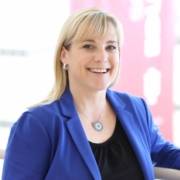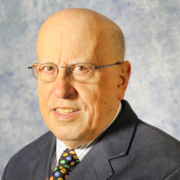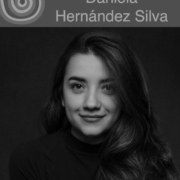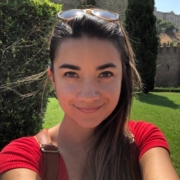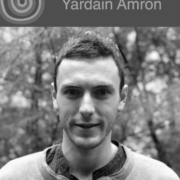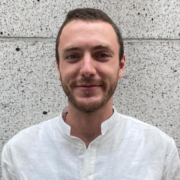Yanan Yu
Behind the Scenes: Am I Able?
Today Yanan Yu joins me to talk about her FreshEd Flux episode, which aired last week. Spoiler alert: we talk about her episode in depth in today’s show, so if you haven’t already listened to her episode, I recommend you do so right now. Really, hit pause, go back and listen to her flux episode, and then come back here to go behind the scenes.
In our conversation today, Yanan details what it’s like to live in a vision centric world and the difficulty of making a podcast. She talks about moving to the United Kingdom and inclusive education.
Yanan Yu completed her master’s degree at the University of Bristol and recently finished an internship at the BBC. She is currently looking to enrol in a PhD program where she can further her studies on inclusive education.
Citation: Yu, Yanan, interview with Will Brehm, FreshEd, 298, podcast audio, October 24, 2022.
https://freshedpodcast.com/yu/
Will Brehm 0:09
Yanan Yu, welcome to FreshEd.
Yanan Yu 1:31
Hello, Will. Hello, everyone.
Will Brehm 1:33
So, Yanan, congratulations on your Flux episode. It’s just so incredible.
Yanan Yu 1:40
Thank you so much.
Will Brehm 1:41
It’s funny to do this because we’ve been working together for basically a year now. And so, I wanted to bring you on to talk about a few things. And I guess to start, I’m curious as to why you applied to the Flux fellowship about a year ago.
Yanan Yu 1:54
At that time, it was because of my personal interests. I had a drawing of to let others listen to me. Listen to my sound and my thoughts. And I have never tried before to produce a podcast or even do any similar things. But I wanted to try. It’s very new and attractive to me. So, that’s why I applied, and I think I wanted to learn some audio production skills. That is another thing that attracted me.
Will Brehm 2:26
At the time when you applied, you were a master’s student, is that correct?
Yanan Yu 2:29
Yes. I just finished my dissertation.
Will Brehm 2:32
At what university?
Yanan Yu 2:33
University of Bristol.
Will Brehm 2:35
Well, it was just so wonderful to have you apply. And now that you’ve sort of gone through the entire process, what was the experience like?
Yanan Yu 2:42
It was amazing, I think you, and Joe, and Brett – the three of you – are very supportive. And all your words and behaviors during my application were very encouraging. And that’s why I kept working on my production. And it was very hard for me editing my episode as a visually impaired person. So, all those experiences was fantastic.
Will Brehm 3:12
Was it a lot of work?
Yanan Yu 3:13
I don’t think it’s a lot of work for sighted people. But I think it’s a little bit more for me.
Will Brehm 3:20
It’s been such a pleasure to work with you over the year. And I’m sure Joe and Brett would feel the same way. We’ve learned a lot from you. We’ve had a really good time putting together your episode. And I hope listeners will find it enjoyable and valuable, your Flux episode. In your episode, you have this line, this quote that I’m going to read out and I’d like to just sort of talk a little bit about it and the line is this: “But it’s not the blindness that makes their lives harder. It’s the assumptions that are made about them being visually impaired that limits their lives, especially in a vision-centric world where vision and cognition are intertwined”. Can you tell me a little bit about how vision and cognition are intertwined in our world?
Yanan Yu 4:03
I think it’s a very hard to explain question. But I want to try to share with you some thoughts. Just in this world of people, we can say “average” people, or sighted people, they think if you can see that your life will be very easy, and you can do all kinds of things. But if you lose your sight, there will be like a horrible nightmare. And it’s like with losing sight, you will lose the intelligence, abilities, even the control to life as well. So, that’s what general people will think about a visually impaired person.
Will Brehm 4:41
And you also call the world vision-centric as if the world is created or those with sight. So, explain that to me.
Yanan Yu 4:50
I think it’s more about people will focus less about people with different physical advantages and just this world is designed for sighted people. Like all kinds of materials, software’s, even our basic facilities in the city are all designed for sighted people. You can notice all kinds of signs, colorful, like logos around you anywhere but those are useless for us. So, these are very obvious things for us to understand a vision-centric world.
Will Brehm 5:26
In this vision centric world, do people treat you sort of differently?
Yanan Yu 5:32
I think so. Only a few people can understand me and treat me equally. Most people do think if you’re visually impaired that means you receive limited education, you lack abilities to work, to compete with people without any visible disability, and you have a lack of intelligence. And it’s impossible for you to achieve something like your peers or your generation. So, I think that’s the general thoughts applied to us.
Will Brehm 6:11
When you were a Flux fellow, one of the things that we realized is how vision-centric audio editing is. Can you explain how it’s so vision-centric.
Yanan Yu 6:24
Of course. I think we tried some different production software but the only usable one for me is the Reaper. Maybe some production apps on iOS system may be useful but I’m currently on Windows. So, they all are using the visual editing platform, you can use your mouse to draw this and click that to easily do the other thing and cut out a long document or something. And you can see those sound waves and you know, where it’s a little bit lower and looks not good. So, you can easily achieve your aims by using a mouse. But for us, we are not able to use a mouse. So, the only way for us to control the editing process is by keyboard and using some hotkeys. So, I feel it is very difficult as a beginner to memorize this like whole list of hotkeys, and to use them and to put -it’s around 40 or 50 different materials together. So, that’s a difficulty for us.
Will Brehm 7:41
For listeners who have never edited audio, what happens is you have these audio files, and they’re just a bunch of waves like lines on a screen. And then you can sort of move a cursor around and sort of edit out sort of segments and you know, you can see the loudness of the audio track or the softness, you can see when there’s silence but it’s so visual, the whole thing. It’s a bit strange, because it’s an audio podcast but actually the behind the scenes is this really visual medium.
Yanan Yu 8:11
Yes, of course. And for us, it will take longer to edit an episode. You can use your eyes to see where I need to put together, where there’s a gap, the gap means a silence and for us just listen from the beginning to the end, or from which point to next point. I need to type down from where to start and to end where. And listen again, and gain. It will take a lot of time.
Will Brehm 8:40
How much time did it take you to edit your episode? Like tell me how you overcame this challenge of working on an audio editing platform that was designed for sighted people
Yanan Yu 8:51
I have never counted the overall time I spent on producing my episode. I think it’s over 100 hours, maybe more. So, the first thing for me is to self-learn how to use it. I don’t want to join any course or to buy some course because my time is limited. I need to work full-time during my editing. So, I just read through instruction. Read through it’s like there is a booklet then memorizing all hotkeys -not all but all useful hotkeys for me. Then try to edit sound sample files, then from the basic steps to move on.
Will Brehm 9:37
You produced something that sounded fantastic in the end. I mean, all that hard work, all that memorizing but you were able to sort of overcome that huge sort of barrier that was created by the audio editing platform and it made me realize that there needs to be an audio editing platform designed for people with blindness rather than people with sight.
Yanan Yu 9:59
There is something, I think. As I know, Reaper, they did something for tailoring screen reader to make maybe accessibility requirements. But I think it’s not enough that only Reaper takes on actions. I hope that in the future, all software’s, all platforms they need to consider people with different needs.
Will Brehm 10:20
I hope so. So, your story that you tell in Flux is just so beautiful in a way, and you talk all about your own abilities despite being blind and sort of play on some of the assumptions that people might have about what it means to be able or not able. And I just wondered, Yanan, if you could tell your own story of how and when you lost your sight.
Yanan Yu 10:43
I lost my sight since I was born. The illness I had with my eyes is Retinitis pigmentosa and we usually called it RP. So, it will gradually affect our sight. But unfortunately, it happened to me when I was born. I nearly had no sight. belonged to the classification of blindness since I was born. So, nearly I got it the first moment I came to this world and until now.
Will Brehm 11:20
The other thing in your episode is the piano is sort of like a major character in the episode. And did you play all of that music?
Yanan Yu 11:28
Yes. I played all music used in my episode. If you hear any sounds caused by piano, that’s me.
Will Brehm 11:39
And when did you learn how to play the piano? Because you’re an amazing pianist.
Yanan Yu 11:43
Thank you so much. I started to play piano when I was around, I think seven or eight years old, and I keep learning keep learning until now.
Will Brehm 11:54
And why did you learn to play the piano?
Yanan Yu 11:57
Because my mother. I personally encountered many – I don’t want to say many – maybe some discrimination and bullying from my playmates when I was around 5,6, 7 years old. And at that time, I felt a little bit lonely. So, my parents: one reason is they think you’ll be better to learn something to maybe study an instrument to help me find friends who can accompany me throughout my life. And then another reason is my father thought maybe for girl learning some instruments will be helpful for future in the marriage market.
Will Brehm 12:40
And does anyone else in your family played the piano?
Yanan Yu 12:43
No, no. Just me. So, my parents spent a lot a lot of energy, money, and time encouraging me with learning piano and to move along from like a beginner to the maybe professional way, I think.
Will Brehm 13:01
Yeah. So, what level are you? From my understanding, there’s different levels of skills for pianists.
Yanan Yu 13:07
I don’t know how to explain it because I just did my bachelor’s in music performance specializing in piano. So, that will be the beginning of a professional career. I don’t know. But I stopped specializing in piano after my bachelor, but I still keep practicing. But I didn’t move on or go further.
Will Brehm 13:33
You once told us that you had this opportunity to play with quite a famous pianist named Lang Lang. So, how did you come about playing music and the piano with Lang Lang?
Yanan Yu 13:44
Yeah, Lang Lang is a Chinese pianist. I think it was more like a coincidence. I joined a competition recommended by my piano tutor in my senior high school and the winners, not only one winner, the winners maybe around 50 can have the chance to appreciating Lang Lang’s concert and play together with him. So, over 3,000 professional and piano amateurs participated in the competition, and I was lucky I got a chance to play together with Lang Lang and it was amazing. And I think it’s a memorable moment to play together with a such a professional in music.
Will Brehm 14:29
I mean it’s quite amazing. Your parents must have been so proud to encourage you to start playing the piano at quite a young age. And then here you are years later, you’re playing with one of the most world-renowned pianists. In the story, you also talk very fondly of your grandparents, and I think there was even some music of you playing at your grandparents’ home.
Yanan Yu 14:52
Of course, the Debussy ballad is in the first and second part of my episode was played in my grandma’s bedroom. Yeah, yeah,
Will Brehm 15:07
Your grandmother’s bedroom, right. And so, tell me about your relationship with your grandparents and what they taught you.
Yanan Yu 15:13
Since I was born, my parents, and me stayed and lived together with my grandparents. So, my parents were very busy with their own work when I was around maybe two or three years old. So, I stayed together with my parents all the time. And when I started to learn the piano, my first piano was just put in my grandma’s bedroom. So, I think they appreciated my playing all the time until my 20’s.
Will Brehm 15:49
Did your grandparents and your parents – how did they instill this sort of love of education? Because in the episode, you sort of get the sense that, you’re on this journey – physically, but also in your own life – of being educated and learning. Learning the piano, of course, is one thing but also doing all these degrees and ending up all the way in the United Kingdom doing a master’s degree. How did your parents and your grandparents sort of instill this love of learning and education in you?
Yanan Yu 16:24
I think it’s more about my grandfather. He did his bachelors – I think, maybe they called it differently – in a very famous university in China. And he is the first few batches of undergraduate students in New People’s Republic of China. So, he encouraged my parents and me to study and to learn as much as I can and to try different things, he thought it’s possible to eat, and wear less valuable things – maybe cheaper, I would say cheaper things. But he never felt it was difficult or felt painful to spend money on education. So, since my primary school, they really provided me the best quality of education. And I think I shared with my grandfather, before I determined to study abroad. At that time, he was in it’s like a nursing home because he was too old to stay alone or stay together in our flat. And he still encouraged me to go on and to try whatever I want.
Will Brehm 17:50
Wow. He sounds like a very special man. How did you end up deciding to study abroad? Because you know, you said earlier that you were studying music and then you decided to do a master’s degree in something different. So, tell me about that journey.
Yanan Yu 18:05
After my bachelors, I started to work in a national organization. And at that time, my parents thought it’s very decent. And I think they will say stable life working there and stay in the capital of our country. But I felt unhappy to go on and to keep that job. And that’s not quite similar to my goal, and my dream of my career path. So, I decided to study abroad, and I got a very valuable offer from my dream University. So, I think study abroad was more meaningful than to keep working there.
Will Brehm 18:55
And so where did you do your first study abroad?
Yanan Yu 18:57
I did my masters in University of Bristol in Disability Studies. So, I think that’s what I really want. And it’s better than a stable work.
Will Brehm 19:08
And so, tell me, what was it like for you to go to Bristol, after spending your whole life growing up in China, near your family, and then going away to learn music at university, and then all of a sudden, you’re on a plane going to Bristol to study something completely different. That must have been very exciting and stressful and scary,
Yanan Yu 19:31
I think is stressful and scary. Yeah. And I went to Bristol alone in 2020. And at the beginning, I thought it’s a very funny thing to study abroad and to live alone. I can do anything I want and I can eat anything I want. Nobody will say no to me because my mother is very, very cautious about my eating habits and my weight. So, in Bristol, nobody knows what I want to eat. Nobody knows what I want to do. Even I can stay awake until 5 am and listen to music, play music. But when I did my first unit it’s like philosophy and research design? Oh my god, it’s a nightmare. I cannot understand what the professor was talking about. And all like philosophers they mentioned about I just heard their names in my past studies. And I really don’t know why we now talk about him and after him why change to another person. Is there any relationship between them, and I will make a guess because I’m not able to fully understand my professor. So, I just make a guess, maybe he is his father. So, talk about him first, then talk about his father.
Will Brehm 20:56
So, here you are, you’re in a new country, living alone for the first time, able to eat whatever you want. stay up as late as you want. But you’re also learning a new subject.
Yanan Yu 21:07
Yeah. A new subject, new – even I want to say it’s a new field for me. Yeah, at the beginning, I know – I don’t want to say I know nothing, it’s very embarrassing. But I know little about it. I just applied for this major because of my personal interest. I have a really good topic I want to explore. But about the training and of course I need to learn for going through and achieve my goal. I know nothing at the beginning, really.
Will Brehm 21:36
And it was also the pandemic, right. I mean, 2020 -were you doing this all online?
Yanan Yu 21:41
Yeah, all online. And I only got two or three offline, on-site courses. And I remember one time really funny and ridiculous. When I sit in the classroom, then someone tells me this course has been canceled, it will be held online, then I took the bus back to my accommodation again.
Will Brehm 22:06
Oh my gosh! And I mean, Yanan, this is just an incredible experience for anybody to be going through. So, what was it like for you, like over the last two years living in the UK studying this new topic, sort of learning how to be in the world without your family close by? You know, how did you grow up in a way? Like, what did you sort of get from this experience over the last two years?
Yanan Yu 22:33
I think the first thing and the greatest thing is I know how to learn by myself. It’s like that horrible experience I shared with you. I don’t know who is that philosopher, why my professor talked about him first, then talk about another one that is very similar. So, I have to spend maybe 10 times more hours than my classmates to read through all the recommended readings to get the course pass and even get a higher grade level. So, this is a very valuable skill for me. Even in my career life, I know how to learn by myself. Just my supervisor said Yanan you need to do this you need to do that. And I know how to divide up objects into small steps and to achieve them and where to find usable materials to help me. And the second thing I think is very beneficial for my future is I can enjoy loneliness. At the beginning, I really didn’t have any friends and my classmates, they are all very helpful, but we are from different countries and at that time, our English especially international students’ English is not quite good. We can understand each other but it takes more time for us to fully express ourselves. So, I always stayed alone, and I was told to stay in my flats in most of my time because it’s a little bit dangerous to go out because of the pandemic. So, I think that’s the two most important and valuable things I gained from these two years in the UK.
Will Brehm 24:23
It’s amazing. And so, after you graduate -so, you said you started the Flux program basically just after you submitted your dissertation. So, other than Flux, what have you been up to over the last year?
Yanan Yu 24:37
I also started my summers work. Some like internships, some like the adventure in the UK. So, this other thing is like going together with the Flux.
Will Brehm 24:51
Right. And so, what’s this internship?
Yanan Yu 24:53
The internship is at the BBC as a team assistant in their management team. I also did my -it’s not about an internship. It’s like a part time job in an accessible tool technology company. So, it is producing a display. And I also tried many different jobs, and I gained a lot, a lot of experience maybe for people to get in maybe 10 years or five years, I gained them all in one year.
Will Brehm 25:22
It sounds like it’s been a really, really busy year. I mean sort of juggling so many different things all at once. I don’t really even know how you do it, Yanan, I mean, but the internship, the Flux fellowship, all the jobs that you’re doing, it’s just sounds like it’s really busy.
Yanan Yu 25:38
It’s not quite busy, I think, but it’s a little bit tiring to do them all at the same time. And it’s valuable for me to understand what I really want in the future.
Will Brehm 25:49
And what is that? What is the future going to hold for you Yanan?
Yanan Yu 25:52
I think in the near future I still plan to go back to university to have my PhD. And I think it will be really helpful for me to do something for my peers and for myself as well. And after that, I don’t quite know what I will do but I think I will work in an NGO or any international organization to help the employment of visually impaired person.
Will Brehm 26:18
Well, Yanan Yu, thank you so much for joining FreshEd. It’s been so wonderful to work with you over the year. Thank you so much, and congratulations on your episode.
Yanan Yu 26:27
Thank you so much.
Want to help translate this show? Please contact info@freshedpodcast.com
Have any useful resources related to this show? Please send them to info@freshedpodcast.com

